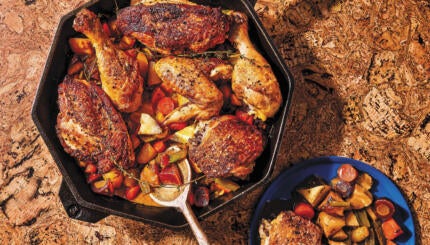When my wife, Rosie, and I were dreaming of opening our own restaurant, we always had this dilemma: Should it be a Mexican taco joint or an Israeli falafel place?
Rosie is Mexican and Jewish and, as a chef, I’d worked with many Mexican cooks, and came to love the flavors, colors and texture of Mexican food. Meanwhile, two of our kids were increasingly interested in veganism. Making our own falafel and pita turned a family meal into family fun.
This dream of ours to have our own restaurant was just that — until October 2017. A friend, who is a real estate agent, told us that a cute space that had once been a burger joint had become available in our town of Pleasantville, New York — but we had to act fast. Before we knew it, our dream was becoming a reality. We sat at our kitchen counter, debating our choice of cuisine out loud until Andrea, the eldest of our three girls, had the brilliant idea to mash them up and call the restaurant Falafel Taco. We loved the concept so much that we signed the lease days later.
Mashing up the menu and recipes was the easy part; writing recipes and organizing a kitchen is my second nature. One of the first items we created was the Mexighanoush Black Bean Falafel, a Mexican take on falafel with cilantro and chili powder topped with babaganoush, chipotle mayonnaise and pico de gallo. The crunchy fried falafel works so well with the creamy baba’ and mayo, set off by the spice of the pico de gallo. While we’ve changed the menu a few times since we opened, this dish stays. People love it.
The Nosher celebrates the traditions and recipes that have brought Jews together for centuries. Donate today to keep The Nosher's stories and recipes accessible to all.
The name Falafel Taco required more digestion. We weren’t sure the Westchester community would “get it.” But as we sat with it, we came to the point where Falafel Taco was us — not just as a restaurant, but as a couple. The first three days of our soft opening in April 2018 were extremely slow, and I was so anxious. Then came the weekend and we had 200 customers in one day, at which point we went from worrying about no customers to having too many. While many wondered about the name Falafel Taco, once they saw us together, they got it.
In the seven years since we opened Falafel Taco, Rosie often gets approached by couples that also identify their relationship as a fusion. Dominican and Jewish, Russian and Mexican, the list goes on. We never thought that our story would encourage others to share theirs with us. It makes us feel so good that our food has such a positive impact.
While we were researching for our original menu, we came upon the story of the Jews that fled Europe for the New World. Centuries before my family fled Hungary and Austria during the Pogroms of the 19th century, it had already happened in Spain. During the Spanish Inquisition, Jews in Spain and Portugal were given a choice to convert, leave or die, which led to many Jews moving to Latin America in pursuit of religious freedom. However, soon after Cortez conquered Mexico came the Inquisition,and many Jews became “conversos,” converting to Catholicism, but secretly practicing their Judaism in basements. To this day, many Mexicans light candles on Friday, have candelabras that hold eight candles and practice other Jewish rituals without knowing why. We even came upon the story of a family in Mexico City who put a dumpling (matzah ball) in their tortilla soup, finding out years later that they, too, were Jews. We serve matzah ball tortilla soup year-round, in homage to them.
The story of Jewish culinary fusion is not new, but since 1948, when Jews moved to Israel either out of desire or need, Jewish food has become more intermingled and complex. Falafel from the Levant was mixed with pickled cucumbers from Eastern Europe, amba from Iraq and zhug from Yemen in a perfect edible example, which ultimately inspired Rosie and I to tell our story through the Mexighanoush falafel.
My Grandma Betty, the rock of our family rituals, loved to travel to Israel, Mexico and Guatemala. I think she would be diverting the street traffic to our restaurant if she were alive today.
Falafel Taco, 30 Wheeler Avenue, Pleasantville, NY 10570
This article was produced as part of The Nosher’s Jewish Food Fellows Program, which aims to diversify the voices telling Jewish food stories in media spaces.



